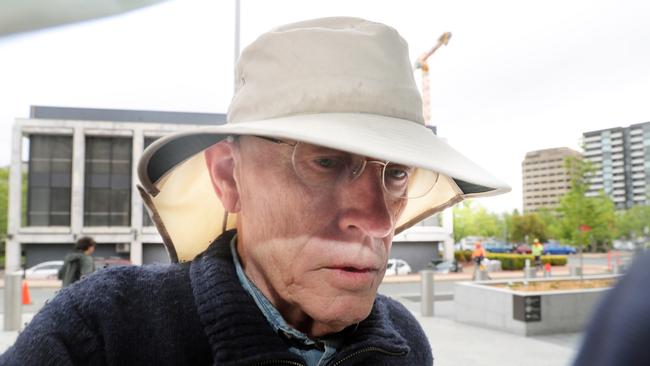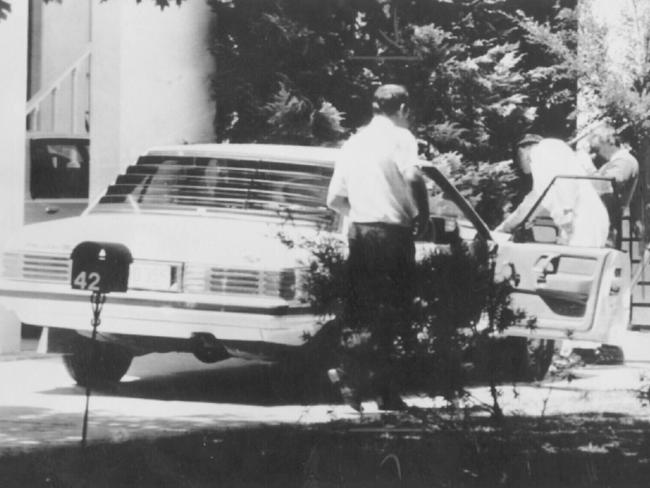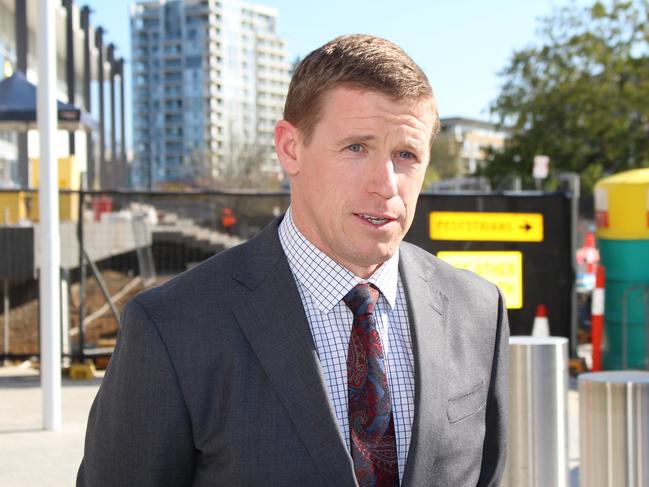‘Lost opportunity for marriage, children and career’: David Eastman
A treasury official wrongly imprisoned over the murder of police chief Colin Winchester has spoken of how he lost the opportunity to get married, have children and mourn the death of his twin sisters while he was locked up for 19 years.

Canberra Star
Don't miss out on the headlines from Canberra Star. Followed categories will be added to My News.
A former public servant has spoken of the “lost opportunities” for marriage, children and furthering his career after he was locked up for almost two decades over the mysterious murder of one of Australia’s top cops.
David Eastman took the stand on Tuesday at the start of his “landmark” compensation case against the ACT Government over his wrongful conviction for the murder of federal police assistant commissioner Colin Winchester — the highest ranking police officer ever to be assassinated in Australia.
It is the first time the now 74-year-old has spoken of the long-running legal saga spanning three decades which saw him jailed for 19 years after an initial trial jury found him guilty of shooting Mr Winchester as he got out of his car near his Canberra home in 1989.
He was acquitted at a retrial in 2018 after a 2014 inquiry found flaws in evidence had led to a miscarriage of justice.
The court also heard Mr Eastman had rejected an act of grace payment from the Government with the figure expected to be revealed in the coming days.

A softly spoken Mr Eastman at times fought back tears on the stand at ACT Supreme Court as he recounted the “elation” and “enormous relief” he felt when the not-guilty verdict was read out.
But he also reflected on the realisation of how much he’d aged and how much time he had lost, including being robbed of the ability to mourn his twin sisters who died while he was incarcerated.
“It was a wonderful moment at the end of a very, very long battle,” he said.
But he described the moment as “bitter-sweet” as he was hit by the “realisation” he was no longer able to enjoy a “full life”.
“I’d lost my opportunity to pursue my dreams, get married, have children and pursue my career.”

Mr Eastman described the “elation” of just being able to do normal things like visit McDonald’s when he was released on bail in 2014 as he awaited his second trial.
He was filled with gratitude when volunteers from The St Vincent de Paul Society picked him up from the prison gates and took him for a “break” to Sydney.
“I was able to shed my prison greens and put on simple civilian clothing for the first time in 20 years which was very gratifying,” he said.
“We stopped at McDonald’s in Goulburn which was the first occasion in 19 years I had a normal social interaction with ordinary people.
“It was a safe and friendly atmosphere and I was particularly delighted there were children and parents.
“I was in a euphoric state of deriving immense pleasure from doing ordinary things with ordinary people.”

This was in contrast the loneliness and fear he had faced for his public safety during his time behind bars.
He finally had the chance to visit the graves of his mother and twin sisters who had passed away while he was in jail.
“Naturally it was a very emotional experience,” he said.
He also recalled vividly a trip to a Penrith Panthers rugby league game and an outing to Wilsons Promontory National Park near Melbourne where he saw trees for the first time in two decades.
But when shown a photo of himself enjoying the outing, he was struck by how much he had aged in that time.

He was no longer the confident swimmer who used to go bodysurfing at Bondi and recalls “gasping for breath within a few seconds” trying to go for a dip at a friend’s place.
After working as a treasury official before he went to jail, he recalls how he went onto the pension and lived in government housing as he tried to rebuild his life and “make friends again”.
“I got a shock when I rode on the bus and a teenage girl offered me her seat and I laughed because I thought she was joking because I was thinking I was still 50.
“I had to recognise that I was 20 years older and that’s the way the world would see me and I thought that would probably impact on my employment.”
Describing himself as an “incarcerated economist” for 25 years, Mr Eastman said he is still trying to find work so he can get off the aged pension.

Mr Winchester was shot twice in the head at close range as he got out of his car at his home in Deakin.
The prosecution’s 2018 case submitted Mr Eastman had a motive because Mr Winchester refused to help him fight assault charges which had damaged his career and that he’d threatened police.
Mr Eastman’s defence lawyers claimed the killing was a mafia hit related to Mr Winchester’s investigation of drug crops near Canberra.
Mr Eastman is suing the ACT government for wrongful imprisonment under the territory’s Human Rights Act.
His barrister Lisa De Ferrari told the court the act afforded Mr Eastman the right to be compensated for the 20 years he spent in jail.
She said the ACT Government had offered Mr Eastman an act of grace payment on the condition he forego his legal right to pursue a case against the government for wrongful imprisonment.
“Again we say that is extraordinary conduct,” Ms De Ferrari said.
There had been a “complete lack of transparency” about how that act of grace payment had been calculated, she said.
She said Mr Eastman wanted “nothing more” than for the court to recognise he has a right to compensation, and for the court to determine how much that should be.
“What he doesn’t want is to be fobbed off by the Crown saying: ‘Well you get whatever the treasury wants (to give you) if you give up your rights.”
Outside court Mr Eastman’s solicitor Sam Tierney described the trial as a “landmark” case.
“I think its been very helpful for (Mr Eastman) to be able to come to court to tell his story,” he said
“It will certainly be a landmark decision, there is no equivalent statute that has been tested in Australia, so we are breaking new ground.”
The compensation case has been listed for nine days before Justice Michael Elkaim but is not expected to go that long.
